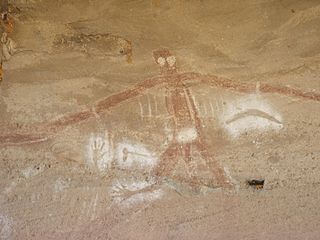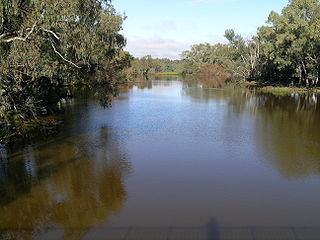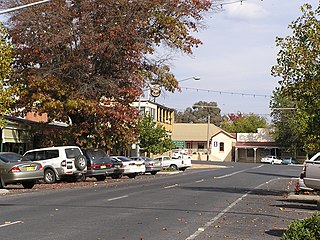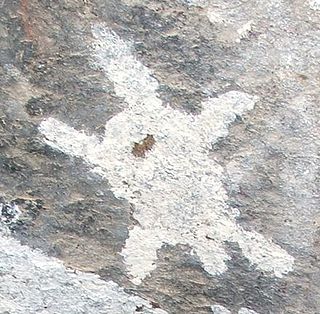The Wiradjuri people are a group of Aboriginal Australian people from central New South Wales, united by common descent through kinship and shared traditions. They survived as skilled hunter-fisher-gatherers, in family groups or clans, and many still use knowledge of hunting and gathering techniques as part of their customary life.

In Australian Aboriginal mythology, Baiame is the creator god and sky father in the Dreaming of several Aboriginal Australian peoples of south-eastern Australia, such as the Wonnarua, Kamilaroi, Guringay, Eora, Darkinjung, and Wiradjuri peoples.

The Indigenous languages of Australia number in the hundreds, the precise number being quite uncertain, although there is a range of estimates from a minimum of around 250 up to possibly 363. The Indigenous languages of Australia comprise numerous language families and isolates, perhaps as many as 13, spoken by the Indigenous peoples of mainland Australia and a few nearby islands. The relationships between the language families are not clear at present although there are proposals to link some into larger groupings. Despite this uncertainty, the Indigenous Australian languages are collectively covered by the technical term "Australian languages", or the "Australian family".

In Australian English, a billabong is a small body of water, usually permanent. It is usually an oxbow lake caused by a change in course of a river or creek, but other types of small lakes, ponds or waterholes are also called billabongs. The term is likely borrowed from Wiradjuri, an Aboriginal Australian language of New South Wales.

Bogan River, a perennial river that is part of the Macquarie–Barwon catchment within the Murray–Darling basin, is located in the central west and Orana regions of New South Wales, Australia.

Tumbarumba is a town in New South Wales, Australia, about 480 kilometres (300 mi) southwest of the state capital, Sydney. Tumbarumba is located on the periphery of the Riverina and South West Slopes regions at the western edge of the Snowy Mountains. The 2016 census showed the population of the town and surrounding area to be 1,862 people. Locals refer to the town as 'Tumba'.

John Rudder was an Australian linguist who studied the Australian Aboriginal languages, of Arnhem Land (Gupapuyngu) in the Northern Territory and the state of New South Wales (Wiradjuri), Australia.

The Ngunnawal people, also spelt Ngunawal, are an Aboriginal people of southern New South Wales and the Australian Capital Territory in Australia.

Wiradjuri is a Pama–Nyungan language of the Wiradhuric subgroup. It is the traditional language of the Wiradjuri people, an Aboriginal Australian people of New South Wales, Australia. Wiraiari and Jeithi may have been dialects.

Brook Andrew is an Australian contemporary artist.
Kevin John Gilbert was an Aboriginal Australian author, activist, artist, poet, playwright and printmaker. A Wiradjuri man, Gilbert was born on the banks of the Lachlan River in New South Wales. Gilbert was the first Aboriginal playwright and printmaker. He was an active human rights defender and was involved in the establishment of the Aboriginal Tent Embassy in 1972 as well as various protests to advocate for Aboriginal Australian sovereignty.

A waddy, nulla-nulla, leangle or boondi is an Aboriginal Australian hardwood club or hunting stick for use as a weapon or as a throwing stick for hunting animals. Waddy comes from the Darug people of Port Jackson, Sydney. Boondi is the Wiradjuri word for this implement. Leangle is a Djadjawurrung word for a club with a hooked striking head.

Stanley Vernard Grant SrAM is an elder of the Wiradjuri tribe of Indigenous Australians from what is now the south-west inland region of the state of New South Wales, Australia. The grandson of an elder who was gaoled for speaking his own language, Grant Sr now teaches the Wiradjuri language to students.
Harry James "HJ" Wedge was a Wiradjuri artist.
Joy Williams, born Eileen Williams and also known as Joyce Riley Williams, Joy Williams Wiradjuri, and Janaka Wiradjuri was an Aboriginal Australian author of poetry and Indigenous rights activist.
Parkes High School is a government-funded co-educational comprehensive secondary day school, located in Parkes, in the Central West region of New South Wales, Australia. It is a part of the Henry Parkes Learning Community.
Neville "Chappy" Williams is an elder of the Wiradjuri Nation, in Western New South Wales, and a former professional boxer. Known as "Uncle Chappy" to those who follow indigenous Australian customs, he is a regular at the Aboriginal Tent Embassy in Canberra and a key opponent of the Barrick Gold Corporation's gold mine project at Lake Cowal. Barrick sold the Cowal Mine to Evolution Mining in 2015.

The Bathurst War (1824) was a war between the Wiradjuri nation and the United Kingdom of Great Britain and Ireland. Following the successful Blaxland, Lawson, and Wentworth expedition to find a route through the "impenetrable" Blue Mountains in 1813, this allowed the colony to expand onto the vast fertile plains of the west.
Yarri also spelled "Yarrie", "Yarry" or "Yarrar" was an Indigenous Australian man of the Wiradjuri language group who took a major part in the rescue of 69 people from the flooded Murrumbidgee River in Gundagai over three days, from the night of 25 June to 27 June 1852.
Kerry Reed-Gilbert was an Australian poet, author, collector, editor, educator, a champion of Indigenous writers and an Aboriginal rights activist. She was a Wiradjuri woman.











